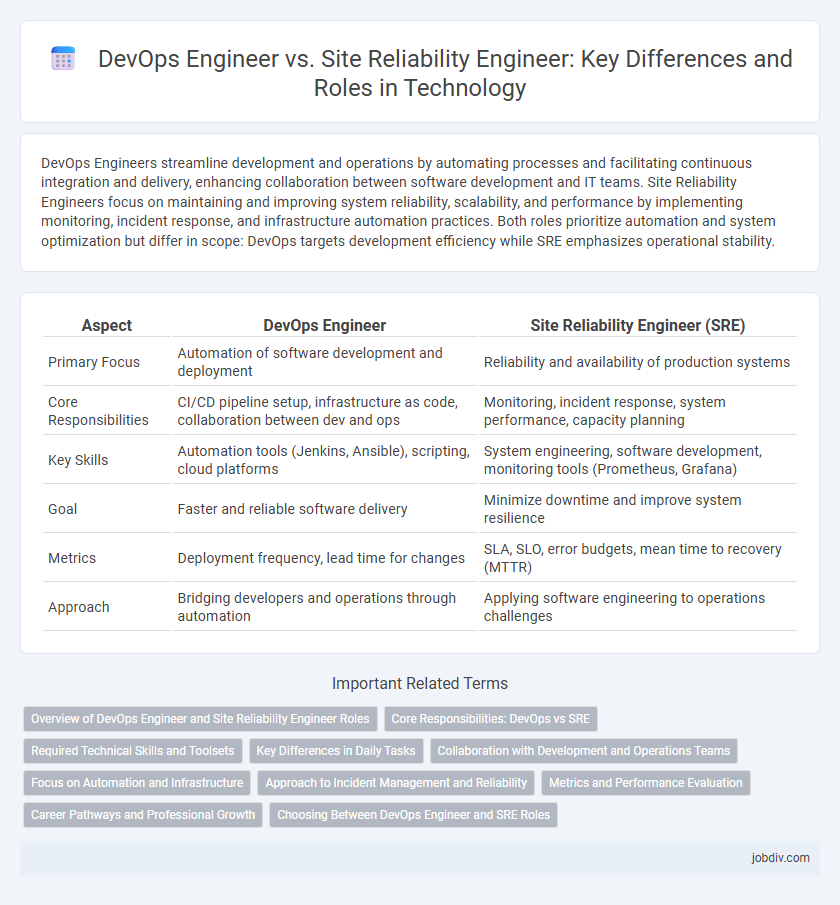DevOps Engineers streamline development and operations by automating processes and facilitating continuous integration and delivery, enhancing collaboration between software development and IT teams. Site Reliability Engineers focus on maintaining and improving system reliability, scalability, and performance by implementing monitoring, incident response, and infrastructure automation practices. Both roles prioritize automation and system optimization but differ in scope: DevOps targets development efficiency while SRE emphasizes operational stability.
Table of Comparison
| Aspect | DevOps Engineer | Site Reliability Engineer (SRE) |
|---|---|---|
| Primary Focus | Automation of software development and deployment | Reliability and availability of production systems |
| Core Responsibilities | CI/CD pipeline setup, infrastructure as code, collaboration between dev and ops | Monitoring, incident response, system performance, capacity planning |
| Key Skills | Automation tools (Jenkins, Ansible), scripting, cloud platforms | System engineering, software development, monitoring tools (Prometheus, Grafana) |
| Goal | Faster and reliable software delivery | Minimize downtime and improve system resilience |
| Metrics | Deployment frequency, lead time for changes | SLA, SLO, error budgets, mean time to recovery (MTTR) |
| Approach | Bridging developers and operations through automation | Applying software engineering to operations challenges |
Overview of DevOps Engineer and Site Reliability Engineer Roles
DevOps Engineers focus on streamlining software development and deployment by automating infrastructure, continuous integration, and continuous delivery (CI/CD) pipelines to enhance collaboration between development and operations teams. Site Reliability Engineers (SREs) emphasize reliability, scalability, and performance of production systems by applying software engineering principles to infrastructure management and incident response. Both roles aim to improve system stability and delivery speed, with DevOps centered on process automation and SRE on maintaining system health through monitoring and proactive issue resolution.
Core Responsibilities: DevOps vs SRE
DevOps Engineers focus on automating software development pipelines, integrating continuous integration/continuous deployment (CI/CD) processes, and collaborating with development teams to streamline releases. Site Reliability Engineers (SREs) prioritize system reliability, uptime, and performance through proactive monitoring, incident response, and capacity planning. While DevOps emphasizes improving deployment velocity, SRE centers on maintaining service availability and minimizing downtime.
Required Technical Skills and Toolsets
DevOps Engineers require proficiency in continuous integration/continuous deployment (CI/CD) tools like Jenkins, GitLab, and Docker, alongside scripting languages such as Python, Bash, and PowerShell for automation tasks. Site Reliability Engineers (SREs) emphasize expertise in monitoring and observability tools like Prometheus, Grafana, and ELK Stack, combined with strong knowledge of cloud platforms AWS, Google Cloud, or Azure, and infrastructure-as-code tools like Terraform and Kubernetes. Both roles demand deep understanding of Linux systems, networking fundamentals, and a solid grasp of configuration management tools such as Ansible, Chef, or Puppet.
Key Differences in Daily Tasks
DevOps Engineers primarily focus on automating software delivery pipelines, continuous integration, and coordinating development and operations teams to accelerate releases. Site Reliability Engineers (SREs) concentrate on maintaining system reliability, managing incident response, and implementing robust monitoring and alerting to ensure uptime and performance. While both roles share collaboration and automation, DevOps emphasizes deployment efficiency, and SRE prioritizes system stability and scalability.
Collaboration with Development and Operations Teams
DevOps Engineers enhance collaboration by integrating development and operations teams through continuous integration and continuous delivery (CI/CD) pipelines, automation tools, and monitoring practices. Site Reliability Engineers focus on building scalable systems and improving reliability by applying software engineering principles to infrastructure, working closely with development teams to optimize deployment and incident response. Both roles prioritize cross-team communication and shared responsibilities to increase system stability and accelerate software delivery.
Focus on Automation and Infrastructure
A DevOps Engineer emphasizes continuous integration and deployment automation to streamline software delivery pipelines and reduce human intervention. Site Reliability Engineers prioritize automating infrastructure management and monitoring to ensure system reliability and scalability through tools like Kubernetes, Terraform, and Prometheus. Both roles leverage infrastructure as code (IaC) and automated testing frameworks, but SREs focus more on maintaining service uptime and incident response efficiency.
Approach to Incident Management and Reliability
DevOps Engineers emphasize automation and continuous integration to streamline incident management and enhance system reliability, focusing on rapid deployment and iterative improvements. Site Reliability Engineers prioritize proactive monitoring, service level objectives (SLOs), and error budgets to maintain high availability and prevent incidents before they impact users. Both roles integrate collaboration and tooling but differ in their strategic focus on operational stability versus development velocity.
Metrics and Performance Evaluation
DevOps Engineers primarily measure deployment frequency, lead time for changes, and mean time to recovery (MTTR) to evaluate software delivery performance and operational efficiency. Site Reliability Engineers emphasize service-level indicators (SLIs), service-level objectives (SLOs), and error budgets to maintain system reliability and optimize uptime. Performance evaluation for SREs relies heavily on balancing reliability targets with feature development velocity, using detailed telemetry data and incident response metrics.
Career Pathways and Professional Growth
DevOps Engineers typically develop expertise in continuous integration, automation, and deployment pipelines, advancing towards roles such as DevOps Architect or Cloud Engineer. Site Reliability Engineers focus on system reliability, incident response, and performance optimization, often progressing to positions like SRE Manager or Infrastructure Engineer. Both career pathways emphasize collaboration, coding skills, and infrastructure knowledge, with professional growth driven by mastery of tools like Kubernetes, Terraform, and monitoring systems.
Choosing Between DevOps Engineer and SRE Roles
Choosing between a DevOps Engineer and a Site Reliability Engineer (SRE) depends on organizational goals and technical focus areas. DevOps Engineers primarily streamline software development and deployment pipelines using automation, CI/CD, and collaboration tools, while SREs focus on system reliability, monitoring, incident response, and scalability through engineering practices rooted in software development and operations. Understanding company priorities such as continuous integration, automation, uptime SLAs, and infrastructure resilience guides the decision toward either role for optimizing IT performance.
DevOps Engineer vs Site Reliability Engineer Infographic

 jobdiv.com
jobdiv.com